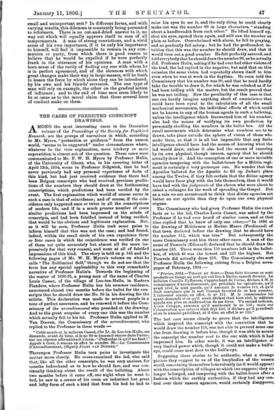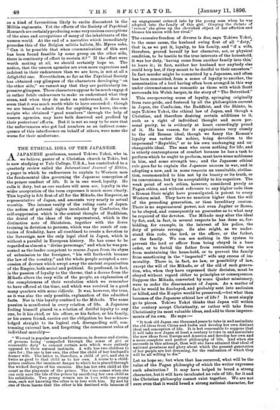THE CASES OF PREDICTED CONSCRIPT DRAWINGS.
AMONG the most interesting cases in the December volume of the Proceedings of the Society far Psychical Research, are the groups of narratives in which, according
to Mr. Myers, "protection or guidance" from the unseen world, 'seems to be suggested" under circumstances where, whatever be the true explanation, mere trickery or mere superstition is almost out of the question. These cases were communicated to Mr. F. W. H. Myers by Professor Hulin, of the University of Ghent, who, in his covering letter of April 13th, 1894, wrote to Professor Sidgwick, that he had never previously had any personal experience of facts of this kind, but had just received evidence that there had been Belgian conscripts who had received previous predic- tions of the numbers they should draw at the forthcoming conscriptions, which predictions had been verified by the event. The first explanation which would of course occur in such a case is that of coincidence; and of course, if the coin- cidence only happened once or twice in all the conscriptions of modern life, and if in a much greater number of cases
similar predictions had been impressed on the minds of conscripts, and had been falsified instead of being verified, that would be the obvious and legitimate explanation. But,
as it will be seen, Professor Hahn took some pains to inform himself that this was not the case; and had found, indeed, within the small circle of his own experience three
or four cases in which the coincidence was verified (in one of them not quite accurately but almost all the more im-
pressively for that very reason), and none at all of falsified impressions of this kind. The story is told on p. 545 and the following pages of Mr. W. H. Myers's volume on what he
calls "The Subliminal Self," though we do not see that the term has any special applicability to this very remarkable
narrative of Professor Malin's. Towards the beginning of the winter of 1890-91, a young man of the name of Charles Louis Casset, of the village of Loo-ten-Halle, in Eastern Flanders, where Professor Mullin. has his summer residence, announced almost two months before the ballot for the con- scripts that he should draw the No. 90 in his drawing for the militia. This declaration was made to several people in a tone of perfect assurance, and he renewed it before the Com-
missary of the arrondissement who presided at the drawing. And to the great surprise of every one this was the number which actually fell to his lot. Professor Malin applied to M. Van Dooren, the Commissary of the arrondissement, who
replied to the Professor in these words :-
" Cette annee-ci, he milicien Casset,Chs L', de Loo-ten-Hulle, me demande, avant de tirer, si he no 90 se trouvait encore dans l'urne; sur ma reponse affirmative it s'ecria :` C'est qu'il me faut !' Appele h tirer, it amen en effet le numero 90.—Le Commissaire d'Arrondiseement, (Signe) Joiais vex DOOR EN."
Thereupon Professor Hulin took pains to investigate the matter more closely. He cross-examined the lad, who said that, like all the other conscripts, he was very anxious for months beforehand as to how he should fare, and was con- tinually thinking about the result of the balloting. About
two months before it came off, one night when be went to bed, he saw in a corner of his room an indistinct but great and lofty form of such a kind that from his bed he had to
raise his eyes to see it, and the only thing he could clearly make out was the number 90 in large characters, " standing about a handbreadth from each other." He lifted himself up, shut his eyes, opened them again, and still saw the number as plain as before. Overwhelmed with alarm, he fe'A to praying,
and so gradually fell asleep ; but he had the profoundest in- tuition that this was the number he should draw, and that it
would turn out a good number. He felt perfectly assured, and told everybody that he should draw the number 90, as he actually did. Professor Hulin, asking if he had ever had other visions of the kind, the lad replied in the negative, but said that on this occasion the same vision had repeatedly shown itself to him even when he was at work in the daytime. He even told the Commissary that his number was 90, and that he need hardly take the trouble to draw it, for which he was rebuked as if he had been trifling with the matter, but the result proved that he was not trifling. Now the peculiarity of this ease is that one can hardly imagine anything short of omniscience that could have been equal to the calculation of all the small mechanical movements, the individual effects of which could not be known to any of the human agents in such a balloting, unless the intelligence which forewarned him of his number, also had the means of verifying its own prediction by personally shuffling the numbers in the ballot box. All the small movements which determine what numbers are to be
drawn, take place outside the sphere of vision of those who make them, so that it is all but impossible that any finite intelligence should have had the means of knowing what the lad would draw, unless it also had the means of ensuring by its own physical, though unseen, agency that he should actually draw it. And the conception of one or more invisible agencies tampering with the ballot-boxes for a Militia regi- ment is certainly a very grotesque one. No wonder that the Apostles balloted for the Apostle to fill up Judas's place among the Twelve, if they felt certain that the divine agency
would have freer play with the lots themselves, than it would have had with the judgments of the eleven who were about to select a colleague for the work of spreading the Gospel. But
as a rule we are accustomed to think that divine agencies act better on our spirits than they do upon our own physical organs.
The Commissary who had given Professor Huhn the exact
facts as to the lad, Charles Louis Casset, was asked by the Professor if he had ever heard of similar cases, and at that time replied that he knew of only one other,—" In 1886 at the drawing of Militiamen at Eecloo, Masco (Ferdinand) of
that town declared before the drawing that he should have the number 112, which was true." But subsequently the same Commissary sent him three other cases. A man of the
name of Pamvels (Edouard) declared that he should draw the number 216. There were then 150 numbers left in the ballot- box, of which 46 was the lowest and 223 the highest. But Pamvele did actually draw 216. The Commissary also sent Professor Htilin the following cutting from a Belgian news- paper of February, 1894 :— "Pevrier, 1894.—TIRAGE AU SORT.—Deux faits bizarres so sent Droduits an tirage au sort qui cut lieu h, Eecloo samodi (fernier. Le milicien Camille Pyfferoen, s'approchant do Fume, &clam h M. le commissaire d'arrondissement, qui presidait les operations, qu'il avait revs, la unit passes, qu'il amenait to numero 111, et qu'il etait convaincu quo he sort retired favorise do ce bon numero. Linteresse amens, en effet, to no 111. M. le commissaire lui avant demande si ce qu'il avait declare keit bien reel, he milicien appela son pore en confirmation de see direr. Un second milicien, Louis Crispyn, annonca qu'il amenerait he no 116; mais sur l'observation quo celui-ci itait dejii tire, it declara qu'il prendrait alors he nnmero precedent, et it tire, en effet he no 116."
The last case seems clearly to prove that the intelligence which inspired the conscript with the conviction that he would draw the number 116, was not able to prevent some one
else from drawing it before him, though it was able to secure
the conscript the number next to the one with which it bad impressed him. In other words, it was an intelligence of very limited power which, though it could not make a bull's- eye, could come next door to the bull's-eye.
Supposing these stories to be authentic, what a strange picture they suggest to us of the busybodies of the unseen world, concerning themselves benevolently (as it would appear) with the conscription of villages to which (we suppose) they no longer belonged, and tampering with the ballot-boxes after a fashion which the earthly authorities, if they had any con- trol over their unseen agencies, would certainly disapprove, as a kind of favouritism likely to excite discontent in the Militia regiments. Yet the efforts of the Society of Psychical Research are certainly producing some very curious conceptions of the aims and occupations of many of the inhabitants of the unseen world. At the end of a narrative which immediately precedes thia of the Belgian militia ballots, Mr. Myers asks, " Can it be possible that when communication of this sort has been found feasible by some group on the other side, there is continuity of effort to sustain it ?" If the effort were worth making at all, we should certainly hope so. The notion, that the unseen agencies are even more capricious and indolent in their endeavours than we are here, is not at all a delightful one. Nevertheless, so far as the Psychical Society has obtained any glimpses of the characters developing on the other side," we cannot say that they are particularly im- pressive glimpses. These characters appear to be much engaged in rather futile endeavours to make us understand what they mean, and when they do make us understand, it does not seem that it was much worth while to have succeeded : though we are bound to admit that for anything we know, the con- scripts who obtained " good numbers " through the help of unseen agencies, may have both deserved and profited by their protectors' efforts. But it is not so easy to be sure that the unfortunates who got bad numbers as an indirect conse- quence of this interference on behalf of others, were none the worse for their misfortune.



































 Previous page
Previous page